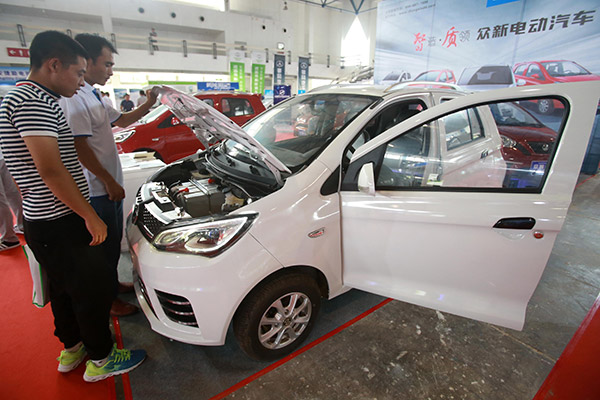New scoring system, tough regulations may rev up green cars in China
Xinhua | Updated: 2017-10-16 08:46
 |
| Visitors check out new-energy cars at an auto expo in Beijing. [Chen Xiaogeng/for China Daily] |
BEIJING-China will impose tough regulations from April 2018 on passenger car makers and importers to reduce energy consumption and expand sales of new energy vehicles or NEVs.
Automakers and importers will be evaluated each year for both fuel consumption of traditional cars and the output of NEVs.
They will be given two separate scores, according to the Ministry of Industry and Information Technology.
If they fail to amass enough credits for either traditional vehicles or NEVs, they may face penalties and their products may not be allowed on the road.
To gain a positive score, car manufacturers must make enough NEVs to accumulate credits higher than 10 percent of their traditional vehicle output by 2019.
The proportion will be 12 percent in 2020.
Any company making more than 30,000 traditional cars in a year will need to comply with the requirement for NEV production.
However, making one new-energy car can generate more than one credit, depending on factors including its type and designed mileage.
For instance, one pure electric car designed to run 300 km with fully charged battery will be given 4.4 credits, and a plug-in hybrid will be given 2 credits.
Companies gaining more credits with NEV output will be given a positive NEV score, which can be sold to other companies, while companies with negative NEV scores have to buy credits from other companies.
The other score for average fuel consumption of traditional models is calculated based on the number of traditional cars produced.
Companies must compensate for poor fuel consumption or low NEV scores within 90 days or face penalties.
Importers face the same rules.
"These measures are necessary for saving energy and the development of the NEV industry," the MIIT said on its website.
At the end of last year, there were 194 million Chinese-owned automobiles, most of which run on fossil fuels, taking more than 70 percent of the country's total gasoline and diesel consumption.
To reduce pressure on energy supplies and the environment, a series of policies have supported the NEV sector, including subsidies, easier access to license plates and construction of charging facilities.
China is the world's largest electric car market. In 2016, NEV sales exceeded 500,000 units, and more than 1 million such vehicles are Chinese-owned, half of the world's total.
However, facing a grim environmental situation and energy restraints, more needs to be done, especially at a time when several developed countries are announcing plans to phase out traditional cars.
A guideline issued by the State Council, China's Cabinet, promised more than 12,000 new charging stations before 2020 to meet the demand of 5 million NEVs.
The new measures are "tough compared with the rest of the world," as China has learned from other countries and considered its own situation, said Dong Yang, vice-director of the China Association of Automobile Manufacturers.
Dong said the measures should not be taken as an early signal of ending sales of traditional cars, as research is still needed on when and how such a measure would work.
Zhao Dongchang with the China Automotive Technology & Research Center said the scoring system is just designed to cut emissions and strengthen the NEV sector.
"It will mainly affect automakers and importers, but the direct impact on consumers is going to be limited," Zhao said.
























